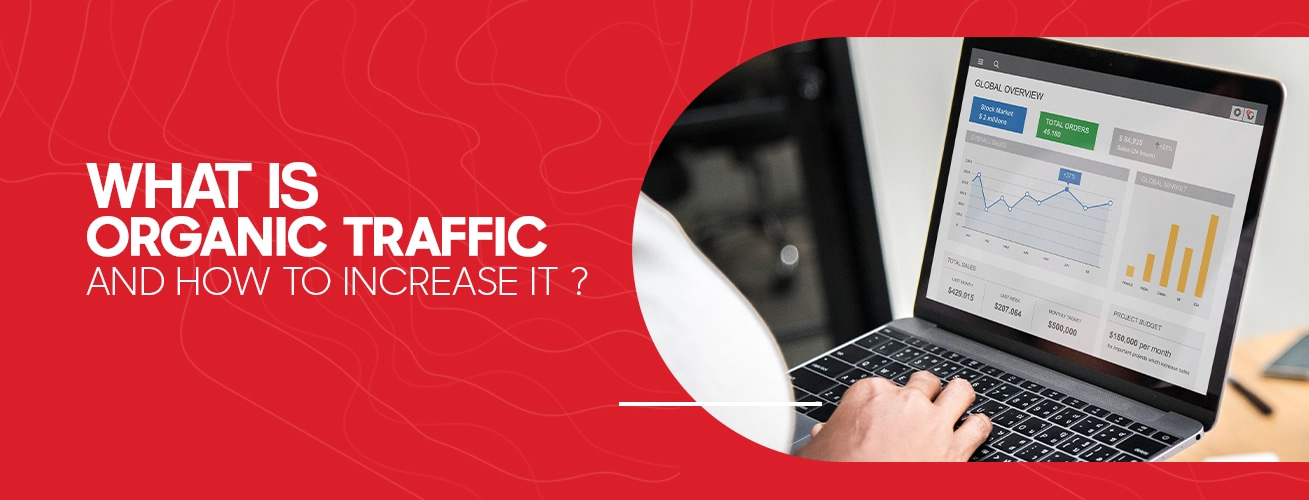What is Organic Traffic and How to Increase It
Needless to say, having a website, no matter how well it is developed and maintained, means nothing, if it fails to attract visitors. In the fast-paced and fiercely competitive eCommerce world, your website must be able to lure visitors on a sustained basis, otherwise, you will have no chance of remaining profitable. But how can one attract website traffic? There are many options available, but none of them is as effective as organic traffic.
Organic website traffic, that is non-paid traffic, has worked wonders when it comes to improved search engine ranking, conversion rates, reducing bouncing rates, enhancing revenue, and the list goes on. Understanding tricks and tips for enhancing organic web traffic is key to earning more leads and revenue. Fortunately for you, we have the essential information that you can utilize to increase this free traffic.
In this article, we are going to help you learn the basics of organic traffic SEO, and other strategies to generate more traffic to your website.
Let’s start with the basics!
Understanding Organic Traffic:
Simply speaking organic traffic is several visitors who are the result of unpaid research engine results. The organic web traffic lands on the website from queries on search engines such as Google, Yahoo, Bing, etc.
This form of unpaid traffic is generated due to increased organic ranking on Search Engine Result Pages (SERPs). There are many ways to earn an improved ranking, one such method is optimizing content on a website and search engine and other SEO strategies.
SEO strategists or SEO marketing firms deploy various techniques such as optimizing website content with keywords that match users’ intentions. There are many other methods as well that we are going to explore in-depth soon.
Paid search traffic is opposite to organic visitors, in this form of traffic, visitors are attracted to desired websites through Pay-Per-Click (PPC) ads on search engine result pages.
Why is Organic Traffic Important in Digital Marketing?
In digital marketing, organic traffic is viewed as the ultimate goal that every marketer aspires to achieve. Here are some reasons that make organic website traffic the most important pillar of digital marketing.
1-Permanent SERP Ranking:
It is one of the biggest advantages of deploying strategies is that it helps marketers get a SERP ranking that is permanent and sustainable. The visitors from paid advertisements immediately dry up as soon as marketers stop promoting or financing the aid. This is not the case with organic traffic.
Since organic traffic is based on the quality of your content, the traffic received is natural and regular. Your competitors find it harder to outflank you. All you need is to strategies the content marketing and keep optimizing the content with relevant keywords and key phrases.
2-Improved Conversion Rate:
The optimization of the keywords of products and services leads to improved traffic, furthermore, if your content is well-written and has a compelling description, it will be ranked higher. This will increase the opportunities for more people will visit your website.
The more visitors, the more opportunities for a better conversion rate. With better organic traffic, you will be in a comfortable position to continue reaping the benefits of a better conversion rate.
3-Cost-Effective Digital Marketing:
Organic-driven traffic is the most cost-effective way of achieving all marketing goals. This doesn’t require any expensive investment; you don’t need to buy software or hire highly paid marketers to run your campaign.
All you need is to optimize web content and description with relevant keywords. Visitors land on your website through normal searches and queries on Search Engine Result Pages (SERPs). This non-paid traffic certainly helps in strengthening your SERP ranking.
Other benefits of employing techniques for organic web traffic are sustainable search engine ranking, better chances of ranking higher on Google, inbound traffic, and more.
Having discussed the importance of natural terrific resulting from organic SEO, now, we will look at how the Search Engine Algorithm works. This understanding is critical to drive further the organic website traffic.
How Does Search Engine Algorithm Work:
The Internet has an incredible amount of information; you cannot sort them out to find the most relevant and the most accurate information. Search Engines such as Google, Yahoo, and Bing sort the information for you. This process is called as SERP ranking system.
Search engines rely upon ranking signals and algorithms to sort through billions of web pages and deliver webpages having the best possible results for the query.
Here is a simplified version of the working of the search engine algorithm.
Crawling:
Search engines use automated programs known as Crawlers, also termed as Bots or Spiders. The spiders first discover and scan known web pages, and then they use available links on these web pages to scan new URLs.
Indexing:
When the webpages have been discovered, the search engine examines the given information. if it finds this information useful and relevant, it adds that webpage to the search engine’s index.
The index is similar to a vast database, containing information such as content of indexed webpages, titles, product descriptions, meta tags, and more.
Ranking:
This is where the search engine algorithm comes into play. When someone performs a query, search engines scour indexed web pages, sorting to find the most accurate and useful information. It then orders the indexed web pages as per their relevance and quality of content.
This ordering of search results by search engines is known as ranking.
Factors Influencing SERP Ranking:
- The ranking is critical. This is key to attracting highly sought-after organic traffic. Search engine ranking is influenced by the following factors:
- Relevance of content
- Quality of content
- User experience
- Meaning of query
- Usability of webpages
- Context and setting
- Backlinks
- Social signals
- Domain authority
Before we discuss the ways and means of increasing organic website traffic, it is important now we see the role of keywords in Search Engine Optimization or SEO.
Role of Keywords in SEO:
Keywords are short phrases and single words that users use while performing their queries in search engines. Website managers use these keywords in their content generation and thus optimize web pages to direct maximum traffic to their websites.
It has been a proven fact that when you align your content available on web pages with topics, products, and services that your target audience is searching for, you will end up driving more traffic.
Keywords can be of various types, such as
- Long-tail keywords
- Short-tail keywords
- Mid-tail keywords
Why Are Keywords the Key Pillar of any SEO Strategy?
Keywords play a key role in any SEO campaign due to the following reasons:
- They are important in identifying and speaking the language of the target audience. In this way, keywords allow you to gain insight into the audience, how they are behaving online, and what their interests are.
- Keywords are instrumental in summarizing content on web pages including images, texts, and videos.
- They help in communicating to Google and other search engines are the webpages are relevant to the queries made in search pages.
- Their role in improving search engine ranking is crucial. They help Google know what kind of content the webpage in particular contains.
- More importantly, keywords have a direct role in directing traffic to websites, increasing conversion rate, and thus helping web managers earn more and generate more revenue.
Now we understand fully the basics of organic traffic and associated concepts, but the most important question is how businesses can drive organic-based traffic, where they should start, and which area they must concentrate on.
This section of the article deals with these questions comprehensively. Let’s cut the crap and discuss strategies to boost organic traffic.
SEO Strategies to Boost Organic Website Traffic:
Here are some key tricks that work wonders when it comes to attracting non-paid and neutral traffic to your website.
#01: On-Page SEO Optimization:
Optimizing content on web pages is an important part of SEO. On-page optimization is a key pillar of any content marketing strategy. In this method, images, HTML tags, and headlines are optimized with relevant keywords.
The images must support content on web pages, they must be instrumental in optimizing meta descriptions and title tags. Furthermore, you must make sure that headlines should be written in a way that makes your posts easier to read and absorb.
If you plan all these on-page optimization tasks, among others, this will help increase organic traffic and earn a top ranking on SERPs.
#02: Off-Page Optimization:
Unlike On-Page optimization which deals with optimizing web content and structure, Off-Page optimization refers to actions that are taken outside the website. These steps help improve the SERP ranking by building the website’s authority and trustworthiness.
Off-page optimization can be performed by various means, some of which are discussed in depth.
-
Earning and Building of Backlinks:
If you are looking to attract traffic outside your website, backlinks are one the best available options. Backlinks are links to your website from other website sources, they help you drive organic traffic in the following ways.
First, when someone decides to link your website to their web pages, this drives traffic from their websites to yours. Second, the backlinks help establish your trust and authority. These features are one of many criteria that Google relies upon to rank your websites on search engines.
Of many options available for earning and building backlinks, writing user-friendly, informative, and engaging content is one of the excellent methods. In this regard, blogging is considered the best source for backlinking. Sharing blogs on social media, writing blogs on various topics, targeting relevant and numerous keywords, and sharing blogs in email newsletters are some ways of leveraging blogging for building backlinks.
-
Leveraging Social Media for Traffic:
Social media marketing is another popular and highly effective way of performing off-page optimization. Engaging your target audience on social media helps you enhance brand awareness and earn more traffic. Here are ways that you can use social media to drive organic traffic to your websites.
- First, you should share content, in particular blogs, on various social media platforms such as Facebook, X (formerly Twitter), YouTube, Instagram, TikTok, LinkedIn, Pinterest, and more.
- Second, submitting content for social bookmarking sites such as Reddit, Diigo, Digg, Tumblr, Pocket, Slashdot, and more is another method to earn visibility and trust.
- Finally, you can use influencers to enhance your outreach and build your trust. Nowadays, influencer marketing has become transformed, you can deploy and use it cost-effectively. Micro-influencers are now the preferred choice for exploiting social media platforms for brand awareness and driving organic traffic.
-
Writing and Updating Engaging Content for Social Platforms:
Content is another major way to boost your organic traffic. Writing keyword-optimized content is exceptionally beneficial because it helps you reach your target audience and earn trust and authority. These in return ensure enhanced organic traffic.
Blogging is one of the most important parts of content marketing. You can add valuable information to your blogs. When your target audience searches for relevant keywords, they will find your blogs in search engine results. You can thus target more and more organic website traffic.
#03: Using Analytics and Monitoring to Track Organic Traffic:
Analyzing and monitoring organic traffic is equally important to ensure steady website traffic. There are multiple tools available that you can use to view organic traffic statistics for free. For instance, Google Analytics and Google Search Console are freely accessible analytics and monitoring tools.
Not only that, if you are interested in knowing the traffic that your competitor’s website is driving, you can use Semrush’s Organic Research tool. This will help you understand the level of competition you are likely to face to remain competitive in the market.
But how you can use Google Analytics in an optimum way? Here is a brief overview of Google Analytics.
Brief Overview of Google Analytics:
- For Universal Analytics, go to your Google Analytics, and then click Acquisition-All Traffic-Channels-Organic Search
- For Google Account 4, go to Reports, then Go for Acquisition- Traffic Acquisition-Organic Search
These are some of the best tips and tricks for improving organic traffic, but how do we know that these SEO tricks work to improve website traffic and better revenue and sales? If you are still sitting on the fence, here are some case studies that we have compiled here to make our point clear to you.
Case Studies and Real-Life Examples:
Here are some real-life examples, showing how effective SEO tricks can be for driving web traffic.
Case Study 01: The CBD Supplier:
CBD supplier struggled with low visibility and lower ranking in search pages. It hired a professional SEO expert company that designed a laser-focused SEO strategy that worked wonders.
The strategy increased the organic traffic by 557% in 12 months, improving its revenue and sales enormously.
Case Study 02: Desktop Ready:
This IT firm hired the services of an SEO marketing agency. The agency focused on auditing technical SEO issues, optimized and updated old content, and improved the social media presence of Desktop Ready.
This helped Desktop Ready enhance users by 409% and grow backlinks from 800 to 1320, and more. Needless to say, Desktop Ready benefited greatly from this rise in organic traffic.
Final Thoughts:
In conclusion, organic traffic is one the most cost-effective and efficient ways to build a robust online presence and earn a top position in Search Engine Result Pages (SERPs). SEO strategy, if it is planned well and executed masterly, can help you drive organic web traffic. You can thus improve the conversion rate, streamline the checkout funnel, and reduce the cart abandonment rate. There are case studies and real-life examples that clearly show that SEO tips and tricks can work wonders and you can enjoy a prominent marketplace.





